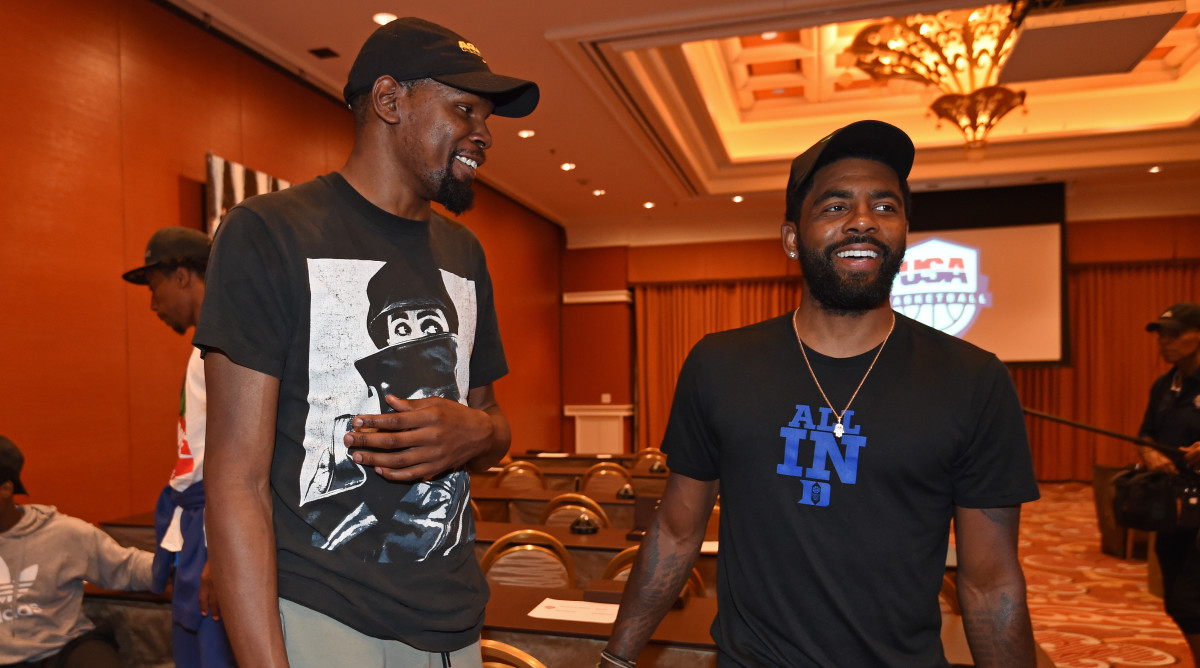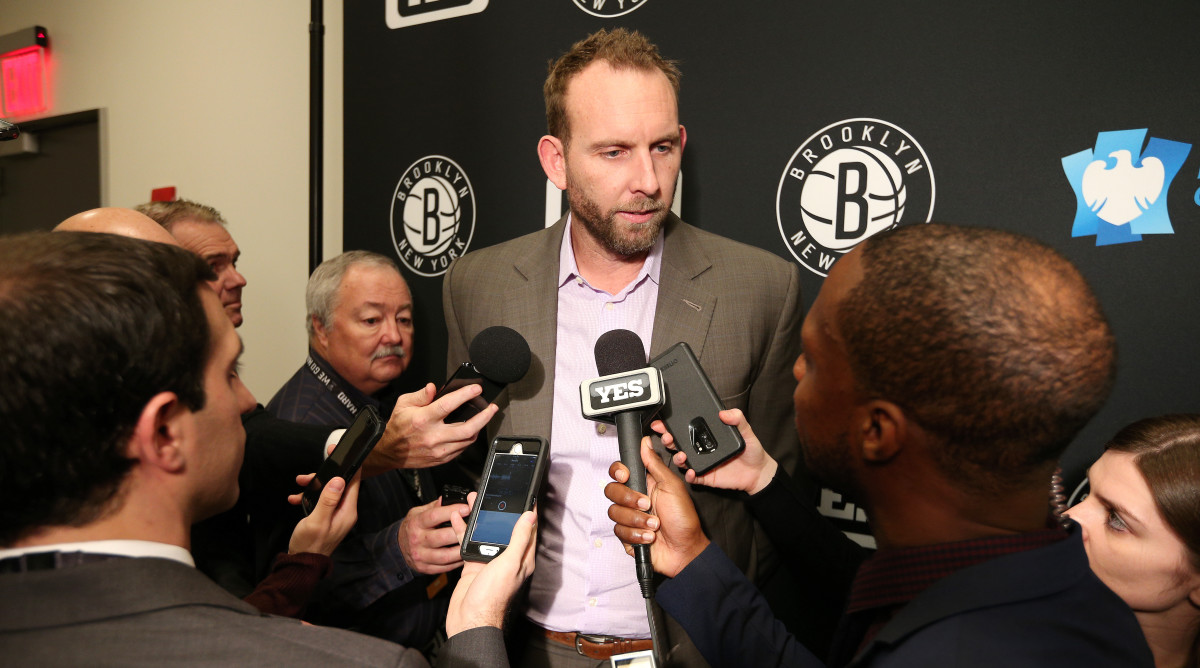Culture Over Tanking: Why Kevin Durant and Kyrie Irving Chose the Nets

Tanking is simple. Tanking is easy. Tanking is sellable. Strip your team down, wipe all your big contracts off the books, pick up a couple of high draft picks and you buy yourself a few years of goodwill to transition from bottom feeder to scrappy insurgent to legitimate contender.
The Nets didn’t tank. The Nets couldn’t tank. The 2013 deal with Boston—which effectively left Brooklyn without its own first round pick through 2018—forced the Nets to be creative. Forced the Nets to be competitive. Forced them to develop a winning culture—or at least try.
On Sunday, Brooklyn’s efforts paid off. Kyrie Irving committed to a four-year contract, a league source confirmed to Sports Illustrated. Kevin Durant also agreed to a four-year deal. Durant confirmed his decision to leave Golden State for Brooklyn on Instagram shortly after the NBA’s official free agency period began at 6 pm ET.
Critics will contend that New York, not the Nets, lured Irving and Durant, and there’s some truth to that. Irving is from New Jersey and has felt the tug of playing close to home for years. Durant has been connected to the Knicks for months, and his budding off-the-court empire makes a New York address—and all that comes with it—appealing. Would Durant and Irving have committed to the same team in Charlotte? In Memphis? Probably not.
But the Nets weren’t competing against the Hornets and Grizzlies. They were competing against the Knicks, and the lure of winning at Madison Square Garden. They were competing against the Clippers and Lakers, glamour franchises with attractive rosters. They were competing against the Warriors and Celtics, teams that could offer more money and, in the Warriors, a better chance to win.

Brooklyn beat back a handful of the NBA’s marquee franchises, and have assembled a team with a championship window. The Nets, not the Knicks, have the star power, and there is no question which team is No. 1 in New York.
What a coup for Brooklyn, and an improbable one at that. Who thought this was possible three years ago, when GM Sean Marks was plucked from the back bench in San Antonio to take over the NBA’s Titanic? The Nets won 20 games in Marks’s first full season; Sean Kilpatrick was the team’s third leading scorer. They won 42 last season, earning a playoff spot with a team backboned by young talent Marks mined through shrewd trades and late draft picks.
The Nets will add Irving and Durant, and will surround them with enviable young talent. D’Angelo Russell will be sacrificed for Irving, but Brooklyn’s roster will be fleshed out by Caris LeVert, a budding All-Star caliber guard; Jarrett Allen, a defensive-minded center; Joe Harris, a sweet shooting wingman; Spencer Dinwiddie, a versatile combo guard. Not to mention DeAndre Jordan, who agreed to a four-year, $40 million deal with Brooklyn on Sunday. Durant’s Achilles injury—barring a stunning recovery, he will miss all of next season—will keep Brooklyn out of the title mix next season. In 2020-21, they figure to be right in it.
There are questions, of course. Durant’s recovery, for one. Durant will be 32 when he next plays in an NBA game, and while an Achilles injury isn’t the career-killer it once was, it’s about as devastating and unpredictable an injury as an NBA player can suffer. Recoveries can vary. Dominique Wilkins was 32 when he ruptured his Achilles, in 1992; he returned as an All-NBA player. Chauncey Billups was 35 when he tore his Achilles; he was never the same. DeMarcus Cousins missed nearly a full year after his Achilles injury and it’s still unclear if he will make it all the way back.
There are reasons to be optimistic that Durant will recover, not the least of which is that as a 7-foot jump shooter his game isn’t anchored to his ability to beat players off the dribble or up and down the floor. But there will be questions until he does.

(An aside, on the Knicks: New York is taking a public beating for reportedly refusing to offer Durant a full four-year max contract. But several executives told SI.com on Sunday that the Knicks did the right thing. They weren’t in the same position as Brooklyn, which had Irving on the hook and a contending roster to surround them with. They weren’t Golden State, which could reasonably expect to contend for 2-3 more titles with Durant back on a five-year deal. With limited pathways to building a title-contending team, you can easily argue that New York’s decision not to roll the dice on a Durant deal was a savvy one.)
Then there is Irving, fresh off a nightmarish season in Boston, where he re-established himself as one of the NBA’s best guards and established himself as a terrible locker room leader. Irving will continue to be scapegoated for the Celtics' failures, but he was only part of the problem. And in signing with Brooklyn, Irving is seizing control of his future for the first time in his career. When Durant returns it will be Durant, not Irving, who becomes the face of the franchise, removing that responsibility from Irving and sliding him back into a role (see scorer, dynamic) he is far more comfortable in.
There are injury risks with Irving, too, as he is just a year removed from a nasty knee injury that required two surgeries to correct. And the relationship with Kenny Atkinson will be watched. Irving chafed at playing for a young, development-minded coach who puts great value in building during the regular season in Brad Stevens; Atkinson has a comparable coaching style. But Irving’s talent is unquestioned.
The NBA attempted to legislate out tanking in the lottery, and the results—with bottom feeders like the Knicks and Suns falling out of the top spots and non-tankers New Orleans and Memphis earning top-two picks—should prove to be a future deterrent. Perhaps the Nets will, too. Brooklyn didn’t have the option of tanking, but the winning culture the Nets built helped them win one of the NBA’s most consequential offseasons.
The Nets spent years trying to get New York’s attention. They have everyone’s now.
